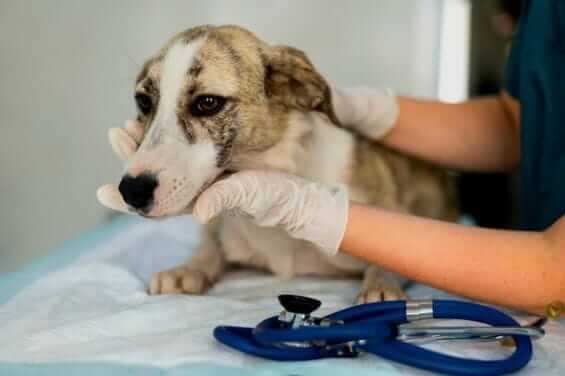Frequent urination in dogs is the most common problem among different dogs breed. This problem usually makes the dog owners worried and puzzled. When you observe that your dog suddenly urinating frequently, ensure to consult a veterinarian promptly. It can be a sign of different health problems present within the dog’s body. Urination is a normal process but frequent urination is not normal and it should be taken seriously.
How Often Does A Dog Urinate?
Dogs normally pee a few times a day. The frequency of urination varies depending on age, size, exercise, etc.
Puppies and smaller dogs urinate more frequently than larger, adult dogs. They pee more than five times a day.
On average, most adult dogs urinate about three to five times a day.
What Are The Medical Causes Of Frequent Urination In Dogs?
It is asked sometimes why is my dog suddenly peeing a lot. Frequent urination in dogs can result from various underlying causes. We must understand these causes so that the underlying cause must be treated properly. The common causes are:
1. Urinary Tract Infections (UTIs):
Dogs who pee a lot may have infections. Urinary tract infections are the most common and primary cause of frequent urination in dogs. Bacteria enter the urinary tract of the dogs and start to spread infection. This infection causes severe irritation, and inflammation in the urinary tract, and dogs feel the urge to urinate frequently.

UTIs are more common in female dogs than males. The other symptoms of UTIs are
- Straining to urinate
- Blood in the urine
- Discomfort
2. Bladder Stones:
Bladder stones are mineral formations that can block the urinary tract. Due to blockage dogs feel increased urgency and frequency in urination.
These stones can cause pain and discomfort for the dog and surgery is required to remove them.
3. Diabetes Mellitus:
Diabetes is a condition in which blood sugar levels increase uncontrollably. It causes excessive thirst. The urge to pee again and again also increases. Dogs that have diabetes mostly urinate more often and in larger amounts. Other symptoms of diabetes are:
- Increased appetite
- Weight loss.
4. Cushing’s Disease (Hyperadrenocorticism):
In this condition, the adrenal glands start to produce a large amount of stress hormone (cortisol). The increase in stress causes increased thirst. Dog pee a lot due to more water consumption. Dogs with cushing syndrome also have some other problems such as
- Hair loss
- Muscle weakness
- Distended abdomen
5. Kidney Disease:
If there is any problem in the kidney then the dog will urinate more frequently because of the improper process of urine filtration. A dog with kidney problems may have some other symptoms such as
- Lethargy
- Weight loss
- Loss of appetite
6. Prostate Problems (in male dogs):
Male dogs with prostate problems, such as prostatitis or an enlarged prostate, may have trouble peeing and urinating more frequently. This can be accompanied by pain and straining.
7. Urinary Incontinence:
Urinary incontinence occurs when a dog loses control of their bladder, resulting in unintended urine leaks. This issue is more common in spayed female dogs and is caused by urethral sphincter muscle weakness.
Frequent urination in old dogs is also a common problem. It happens because Older dogs or those with weakened pelvic muscles can also develop incontinence. Incontinence causes unintentional urine leakage and increased urination frequency.
8. Medications and Diuretics:
Certain medications can cause an increase in urination as a side effect. This mostly happens if your dog has started a new medication recently. When beginning a new medication for your dog, always contact your veterinarian about potential adverse effects.
9. Bladder Infections (Cystitis):
Bladder infections, or cystitis, are localized infections in the bladder. They cause sores swelling and irritation in the urinary bladder. Due to irritation dogs may urinate more often to comfort themselves. Other symptoms of cystitis in dogs are
- Straining
- Discomfort
- Blood in the urine
10. Behavioral Factors:
Changes in a dog’s environment or routine can cause anxiety or stress. Some dogs may urinate more frequently as a response to stress or excitement. Identifying and addressing the source of stress can help manage this issue.
11. Hypercalcemia:
Hypercalcemia is a condition in which calcium in the blood increases. Due to the increased calcium in blood dogs feel more urge to drink water and as a result, they pee a lot. Other symptoms of hypercalcemia are
- Laziness
- weakness
- Loss of appetite
This condition can be caused by various underlying issues, including primary hyperparathyroidism.
12. Hormonal Changes:
Hormonal fluctuations, such as those associated with pregnancy or estrus (heat cycle) in females, can lead to frequent drinking and urination in dogs. During these times, female dogs may urinate more frequently.
13. Polydipsia:
Polydipsia refers to excessive thirst, which can be a primary cause of frequent drinking and urination in dogs. Dogs with conditions like kidney disease, diabetes, or Cushing’s disease often experience polydipsia, which causes increased urine output.
What Are The Non-Medical Causes Of Frequent Urination In Dogs?
Certainly, let’s incorporate this valuable non-medical information into the causes of frequent urination in dogs:
Age:
Puppies urinate more frequently than adult dogs. It is because they have very small bladders and the rate of metabolism is very high in them.
As they age, the capacity of their urinary bladder increases and they do not feel the urge to pee a lot.
Size:
The small dog breed also urinates more frequently than the larger dog breed. This is because small dog breeds have small urinary bladders and their capacity to hold urine is very low.
Diet:
Diet can significantly impact a dog’s urination frequency. Low-protein and high-sodium diets might cause excessive urination. Dogs who eat high-sodium diets may need to consume more water to balance their electrolyte levels, resulting in more frequent urination.
Increased Activity:
Exercise and physical activity can cause dogs to lose water through sweat and panting. As a result, they may become thirstier and subsequently dog urinate frequently. This is a natural response to maintaining hydration during physical exercises.
Heat:
Warmer weather often leads to dogs drinking more water to stay cool and hydrated. Consequently, increased water intake can result in more frequent urination during hot months.
Weather Conditions:
Weather conditions can affect a dog’s urination behavior. Some dogs may exhibit unusual urination patterns during stormy weather. For example, dogs with anxiety may hold their urine for extended periods during thunderstorms or avoid going outside if it’s raining. When they do eventually urinate, they may release larger amounts due to the extended holding period.
When To Seek Medical Assistance For Frequent Urination?
If there is not any non-medical change in the dog’s environment, and still your dogs peeing a lot then there is an urgent need for a veterinarian’s checkup. Your dog will show some other symptoms such as
1. Excessive Thirst
2. Increased Urination Frequency
3. Straining or Discomfort
4. Blood in the Urine
5. Accidents Indoors
6. Lethargy and Weight Loss
7. Change in Urine Color or Odor
If you see that dog urinating frequently and any symptoms that are mentioned above ask for veterinarian help immediately. Always remember that if the problem is detected early, it can be treated more easily.
How To Diagnose The Cause Of Frequent Urination In Dogs?
If you notice that your dog is peeing frequently, it’s essential to consult a veterinarian for a proper diagnosis. The veterinarian diagnoses the cause of the frequent urination and treats it properly. The diagnostic process mostly involves the following steps:
1. Medical History:
Your vet will start by taking a thorough medical history, including details about your dog’s diet, activity level, and any recent changes in behavior.
2. Physical Examination:
A physical examination allows the vet to assess the dog’s overall health and check for signs of discomfort or abnormalities.

3. Urine Analysis:
A urine test is taken to identify the cause of the problem. A urine test provides complete information about the health of a dog’s urinary tract. It provides information about infections, sores, inflammation, or any present stone.
4. Blood Tests:
Sometimes veterinarians may take some blood tests for the identification of disease. Blood tests provide information about underlying conditions such as diabetes, kidney disease, or Cushing’s disease.
5. Imaging:
Imaging tests such as X-rays or ultrasound are also taken to visualize the urinary tract.

6. Culture and Sensitivity Testing:
If a urinary tract infection is suspected, veterinarians further take a urine culture and sensitivity test. These tests help identify the specific bacteria that is causing infection.
7. Endoscopy or Cystoscopy:
In complex cases, endoscopic procedures are done to examine problems in the urinary tract, and sometimes tissue samples are collected for further analysis.
Once the cause of the disease is identified, it is treated accordingly.
What Are The Treatments For Frequent Urination In Dogs?
The treatment for frequent urination in dogs depends on the underlying cause. The common treatment options are:
1. Antibiotics:
If there is any infection in the urinary tract, it is treated with antibiotics. The antibiotics are prescribed depending on the results of the urine culture and sensitivity testing.
2. Dietary Changes:
In cases involving bladder stones, dietary adjustments can help dissolve certain types of stones. Specialized prescription diets are recommended.
3. Medications:
Dogs with diabetes may require insulin therapy to regulate blood sugar levels. Similarly, Cushing’s disease may be managed with medication to control cortisol production.
4. Surgical Intervention:
Bladder stones, prostate issues, and other physical obstructions may require surgical procedures. The stones are removed and the prostate issues are corrected with surgeries.
5. Management of Incontinence:
In cases of incontinence some medicines are given. In severe cases, hormonal replacements are done.
6. Lifestyle Modifications:
Managing stress, anxiety, and behavioral issues requires changes in the dog’s environment and training, or the introduction of calming techniques.
7. Fluid Management:
In kidney disease, the intake of fluids is controlled. Sometimes body fluids are cleaned by using different medical procedures.
Always follow the recommendations of the veterinarians. Always monitor your dog’s condition, whether it is getting better after the treatment or not.
Preventing Frequent Urination In Dogs
While you can’t always prevent every cause of frequent urination, there are steps you can take to promote your dog’s urinary tract health and well-being:
1. Maintain a Healthy Diet:
Give your dog a balanced food that is appropriate for their age, size, and level of exercise. High-quality dog food can help in their general wellness.

2. Hydration:
Provide your dog with a good amount of clean and fresh water. If they will stay hydrated they will be less likely to get sick.
3. Regular Exercise:
Exercise helps maintain muscle tone and overall health, which can contribute to a healthy urinary tract.
4. Regular Vet Check-Ups:
Schedule routine veterinary visits to monitor your dog’s health and catch potential issues early.
5. Promptly Address Infections:
If you observe any changes in the routine of urination of your dog or you suspect any signs of infections in your dog, ask for veterinarian help immediately.
6. Dental Care:
Oral health is linked to overall well-being, and poor dental hygiene can lead to infections that may contribute to urinary issues.
7. Stress Reduction:
Keep your dog stress-free with the help of different activities. For example, take them for a walk, play with them, and show affection to them.
Your dog’s health must be your first priority. They will always adore the care and love you have shown them. I hope you liked this article. Do share your thoughts in the comment section.





